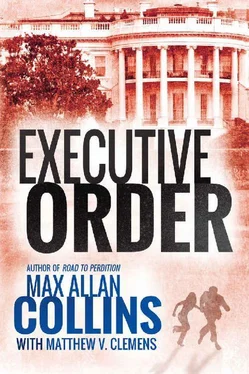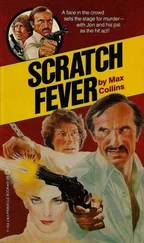“Understood,” Nichols said.
Soon, with Nichols at the wheel of a Bureau Ford, the two-hour drive to Chambersburg, Pennsylvania, was spent going over Wooten’s file as e-mailed by Miggie to Rogers’ burner, though there was precious little in it.
Wooten had entered the military after getting an associate degree in police science from Harrisburg Area Community College. Rogers figured that (like her), Wooten had intended to become an MP, but (unlike her) never made it into the Military Police. Instead, he’d entered sniper school, at which point his military record became conspicuously sparse; nothing of note beyond an unremarkable tour of duty stateside. It was as if he went to sniper school then just disappeared for eighteen months until his honorable discharge.
Rogers wondered where Miggie had gotten the information about Wooten’s black ops in Afghanistan. Were there more off-the-books activities of Wooten’s in that part of the world, or others for that matter?
A sleepy burg of fewer than 25,000 souls, Chambersburg depended mostly on tourism — thanks to its rich history, quaint downtown, and Appalachian setting — though with the surrounding communities, the greater metro area swelled to about 50,000 with some decent manufacturing jobs available. Amish and Mennonite farmers beyond the city limits made up part of the population as well. It reminded Rogers of her home area back in Iowa, even down to the fields of corn surrounding the town.
The biggest employer, though, was five miles north — Letterkenny Army Depot, the place from which Wooten’s father had recently retired. Amos and Constance Wooten lived in a brick bungalow on a two-lane highway called Edenville Road, where lawns large enough to require riding mowers overwhelmed modest houses like theirs.
Rogers left the car in the driveway and the three FBI agents walked up a brick walk. The quietude reminded her of her farmland home, too — this was just far enough toward the edge of town not to get regular traffic, with only the barking of a dog and the breeze whispering through trees to test the silence.
Rogers knocked on the door and waited. She was just about to knock again when a shadow crossed the thin curtains behind the wooden door’s glass.
Another second and the inside door opened, leaving only the screen between her and a slender man in his sixties with thinning gray hair and Tony Wooten’s nose. He wore a Philadelphia Eagles T-shirt and new-looking jeans.
“Mr. Wooten?”
“Yes...?”
She held up her credentials. “Special Agent Patti Rogers with the FBI. With Special Agents Anne Nichols and Lucas Hardesy. May we come in, sir?”
“What’s this about?” Mr. Wooten asked, understandably taken aback. One FBI agent on his doorstep would be bad enough... but three?
“I’d rather not discuss it out here, sir,” Rogers said. “May we come in, please?”
With a frown, Wooten swung open the screen and they trooped in. The living room was smallish but nice, homey. Family pictures — son Tony with a younger brother and older sister peered at them pleasantly from over the years — rested on perfectly dusted end tables, a sofa with a knitted afghan hugged one wall, a BarcaLounger sat next to a couple of wing chairs, each facing a flat-screen TV on a stand.
Hardesy asked, “Is Mrs. Wooten at home?”
At first alarmed, then reluctant, Mr. Wooten twisted toward the back of the house. “Connie,” he said, barely raising his voice.
“What is it, dear?” came a voice from a doorless doorway onto the kitchen. Plates were clinking. “I’m busy right now!”
Bringing his wife into the mix had brought home to their host how serious a visit this was, and Amos Wooten said simply, “FBI.”
A short, stocky, aproned woman, her hair a shade of red unknown in nature, stepped into the room drying her hands on a towel. Her eyes were light blue and very pretty. “Did you say FBI?”
Rogers made the introductions again, ending with, “Perhaps we might all sit down.”
The Wootens traded a look and moved to the sofa and sat down side by side. Within moments, their hands found each other. The agents assembled seats around the humble living room.
Every law enforcement officer hated this part of the job, hated it like poison. Rogers had been the bearer of bad news more than once back in her county deputy days, and it never got easier. As a federal agent, she usually came in well after someone had already received the worst news of their lives.
“Mr. and Mrs. Wooten,” she said, “your son Tony died last night in Hillcrest Heights, Maryland.”
The wife’s grip tightened on her husband’s hand, her knuckles turning white.
“I’m sorry to have to tell you this,” Rogers continued, “but Tony was murdered.”
She waited for the tears, the explosion of grief, but instead found herself staring at two people whose wide-eyed confusion said they didn’t understand a word she was saying.
Mr. Wooten said, “In Maryland, you say?”
“Yes. Hillcrest Heights. He was living there, but you probably knew that. Did you know that?”
Mr. Wooten looked at his wife, bewildered, and she looked back at him the same way. “There has to be some mistake, Agent Rogers — Anthony isn’t even in the country.”
Was there any way Miggie might have misidentified the shooting victim? No, the file photo matched. And she was not about to show these parents the photo from the coroner’s office. On the burner phone, she called up Tony Wooten’s military file and his photo.
She held the phone out to the father who studied it, squinting at it, as if trying to make out a distant figure on the horizon. He gave Rogers a look that asked for the phone, and she nodded and gave it to him.
Soon father and mother were looking down at the photo on a phone that was in both their hands.
“That is your son?” Rogers asked.
They didn’t need to reply. Tears trailing down the mother’s cheeks, and the tremor in the father’s hand as he handed back the phone, gave the answer.
Rogers said, “We’re very sorry for your loss.”
Mrs. Wooten’s head tipped forward and a small sob escaped. Hardesy got up and went to her and handed her his handkerchief. She accepted the offering with a nod of thanks, and he went back to his chair.
Mr. Wooten gave Rogers a hard, direct look. “What happened to Anthony?”
“He was shot. From a distance, by a man with a rifle.”
Tears welling, the father asked, “Who in God’s name would want to shoot our son? In Maryland! He was a good boy — he served his country honorably.”
“We were hoping, sir, that you and your wife might have some idea.”
Spreading his hands in surrender, the father said, “We told you! We didn’t even know he was in the country. We thought he was overseas.”
“Where, specifically?”
The barest hint of a smile crossed the man’s face, then disappeared into sorrow. “He always said that if he told us, he’d have to kill us.”
The echo of what Miggie had said to her a few hours before gave her a shiver.
Mrs. Wooten looked up from her lap and said, “It was all top-secret work for the government.”
Great. No help. “What kind of government work was he doing if he was out of the Army?”
Mr. Wooten shrugged and shook his head a little. “Well... he was working as a contractor.”
“Do you know what he was contracted to do? Who might have contracted him?”
The father shook his head. “Anthony just said ‘top secret,’ and we respected that.”
Another dead end.
“Whatever it was,” Mr. Wooten volunteered, “there’s a strong possibility it was... that it wasn’t strictly... legal.”
His wife drew in a breath and gave him an I-can’t-believe-you-said-that look, and Rogers felt her stomach tighten.
Читать дальше












